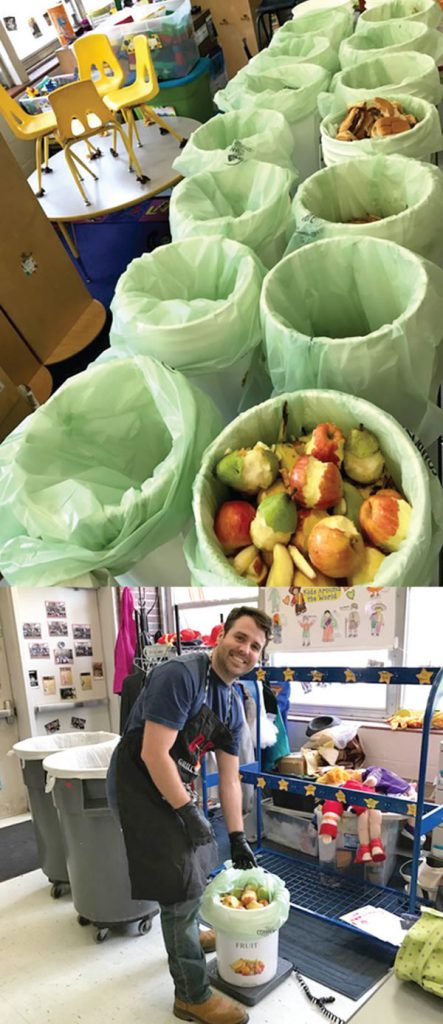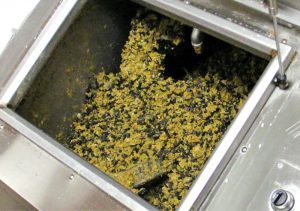Tennessee Department of Environment and Conservation found most food recovery and organics recycling activities are performed by small businesses, nonprofits, and churches and targets assistance to those entities. Part II
Alle Crampton
BioCycle October 2017

Vanderbilt University, Nashville
With 17 percent of the population in Tennessee food insecure, recovering wasted food and food waste is becoming one of the state’s bigger initiatives. One in six Tennesseans (more than 1 million in total) struggles with hunger, while one in four children go to bed hungry. The Tennessee Department of Environment and Conservation (TDEC) issued a white paper in October 2016 that outlines state initiatives to address wasted food and food waste upstream of composting and anaerobic digestion.
In the white paper, many areas — including TDEC programs, the National Resource Defense Council (NRDC) initiatives, higher education entities, nonprofit organizations, etc. — were researched and defined to assess what support programs existed and identify gaps that could be filled by TDEC. The findings gave TDEC insight into potential recommendations for opportunities that could be pursued and implemented in Tennessee. What TDEC ultimately found is that most food recovery and organics recycling programs are not happening on a local government level, but rather with small businesses, nonprofits, and churches. TDEC saw an opportunity to help guide these individual efforts by taking part via the state’s Get Food Smart TN program and creating opportunities for citizens through education and outreach, grants, and programs.
In the context of TDEC’s white paper, “food waste” is used to describe food that is “unfit for human consumption” and is sent for some method of disposal, while “wasted food” is a term used by the U.S. EPA that refers to “wholesome, nutritious food that is lost or sent for disposal.” This wasted food includes but is not limited to “unsold food from retail stores or untouched prepared food or trimmings from restaurants, grocery stores, cafeterias, or industrial processing.”
Part I of this article, “Reducing Wasted Food In Tennessee” (August 2017), provided an overview of policies and programs in the state that impact food recovery and donation, e.g., laws and tax incentives. It also reported on local initiatives. Part II continues the profiling of initiatives, focusing on state agencies and higher education institutions.
TDEC Initiatives

TDEC’s Office of Sustainable Practices and Office of Policy and Planning help K-12 schools determine how they can participate in food waste reduction and recovery. This includes conducting waste audits to identify what is going into the trash.
Organics Management Grants: TDEC recently introduced organics management grants that aim to reduce the amount of materials going to the landfill. These grants “support the entire spectrum of organics management,” including but not limited to composting, food recovery, food donation, education on food waste and recovery, and diversion infrastructure. All of these methods of organics management support TDEC’s 2015-2025 Solid Waste and Materials Management Plan. Through these grants, TDEC is hoping to see a small change that develops into a cultural change.
Get Food Smart TN: In a statewide initiative to reduce food waste, TDEC’s Office of Sustainable Practices (OSP) and TDEC’s Office of Policy and Planning partnered to develop the Get Food Smart TN program, which was unveiled at the Tennessee Recycling Coalition’s annual conference in August 2017. Get Food Smart TN provides tips and resources to Tennesseans on several levels, focusing first on using meal planning so people do not purchase an excessive amount of food. This helps eliminate the amount of food that is bought, spoils, and then is discarded. Get Food Smart TN also provides information on canning and freezing to further eliminate the possibility of nutritious, edible food being wasted. Beyond households, if food is at risk of being wasted, the program serves as a guide to educate people on appropriate places for and methods of donation. Tennesseans are also able to take the pledge to “Get Food Smart.”
Nashville Food Waste Initiative: TDEC’s OSP and DSWM are also working with NRDC on its Nashville Food Waste Initiative (NFWI), which aims to reduce food insecurity and food waste in Nashville (see Part I for details on the Initiative). Together with NRDC and the City of Nashville, OSP and DSWM are determining how state government can further incentivize a reduction in wasted food and food waste. One goal of NFWI is to share Nashville’s success stories nationally so that they can be replicated by cities throughout the country.
K-12 Schools: OSP and DSWM are also helping K-12 schools determine how they can participate in food waste reduction and food recovery. Schools can request waste audits to help them identify what exactly is going in the trash, and then determine appropriate changes. For example, schools can determine if a certain meal is consumed less and then modify their menu. Schools can also identify how many items such as single serve milk cartons and whole apples are notconsumed, and then set up a recovery table to capture the items for donation.
Higher Education Institutions
During TDEC’s food waste and wasted food research, it was discovered that several higher education institutions in Tennessee also were enthusiastically striving toward reducing food insecurity and food waste as well. Several programs are described below:
Vanderbilt University, Nashville: Vanderbilt’s Campus Dining’s Eat the World, Save the Earth operates several food recovery and food waste diversion programs that focus on educating people about actions such as purchasing local, recycling, donating food to local charities, composting, etc. This training is offered to all staff, and Dining Services partners with students to recycle fry oil to produce soap alternatives. In 2015, Vanderbilt Campus Dining partnered with Coca-Cola to install a food waste liquefier to manage food waste on-site. Additionally, through its SustainVU initiatives, Vanderbilt diverts leftover food to Second Harvest Food Bank.
Lipscomb University, Nashville: Lipscomb’s Share our Supper (SOS) initiative, operated by the undergraduate Dietetics program, supports diversion of wasted food. Several years ago, students partnered with the Nashville Food Project (NFP) to identify resources needed to create the infrastructure required to operate a cafeteria that enables a wasted food diversion program. Following approval from the Student Government Association, a nominal investment in materials such as large trays and containers to store and transport food allowed SOS to reduce the logistical barriers to its work. In the first six months of operation, the program donated over 600 pounds of food to NFP. As of February 2016, Lipscomb announced it would be delivering recovered food twice a week to NFP.
Rhodes College, Memphis: Rhodes College’s ultimate goal is to become food waste free. Part of working toward that goal was to establish a local Food Recovery Network Chapter in 2011 to coordinate donation of leftover food from the college’s cafeterias. All recovered food is given to St. John’s Methodist Church, First Congregational Church, and St. Vincent DePaul Church. The food is then distributed to underserved communities in the area. Since its formation, the Rhodes College Food Recovery Network Chapter has collected over 3,000 pounds of food.
Maryville College, Maryville: Maryville College also established a local Food Recovery Network Chapter after senior students recognized opportunities for food waste reduction through food donations. In the beginning, leftover bread from local bakers was gathered for donation to food banks. After collecting over 500 pounds of bread, the students realized the need for a larger operation and partnered with the college’s campus dining provider. Student volunteers retrieve food that the dining provider has saved and refrigerated, transfer it to reusable containers and deliver it to one of the three delivery sites every Monday and Friday afternoon: Martin Luther King Jr. Community Center, Boys and Girls Club of America and Family Promise of Alcoa. The three organizations take the donated items and provide meals to local families.
These schools serve as great models for others. Educating staff and students on organics management best practices, and creating community outreach through donations are effective tools to involve others and take part in a culture change. In the process, infrastructure is created for future food recovery.
Alle Crampton is an Environmental Specialist with the Tennessee Department of Environment and Conservation (TDEC) Office of Sustainable Practices. She works on food waste prevention across the state, and serves as the administrator for the Tennessee Green Star Partnership.











